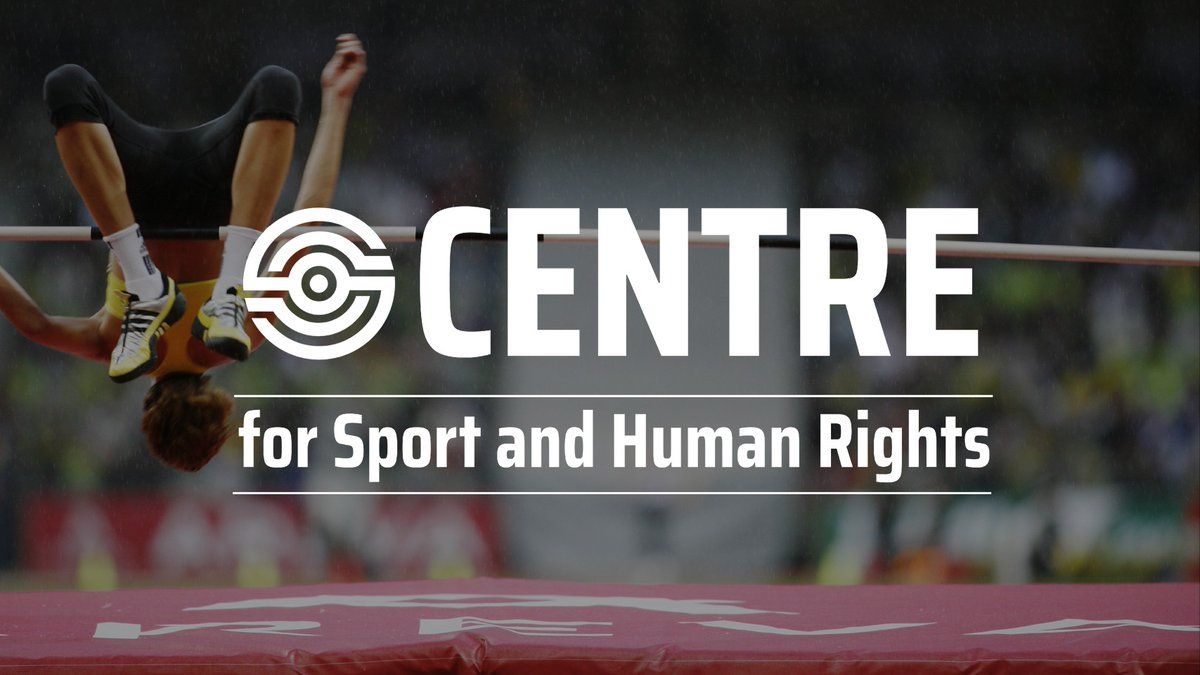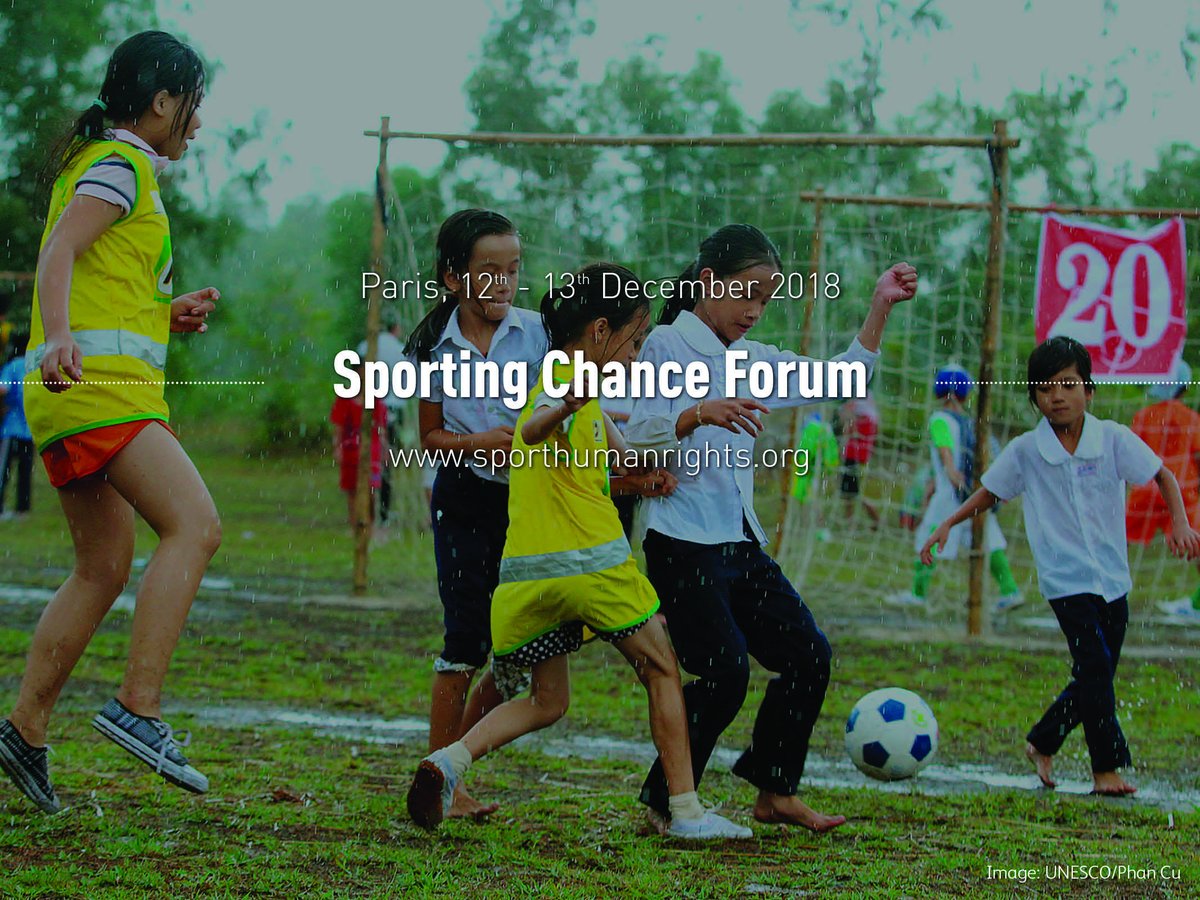
CENTRE FOR SPORT & HUMAN RIGHTS CHAIR CALLS FOR URGENT & COLLECTIVE ACTION
The third annual Sporting Chance Forum convened in Paris 12 -13 December, bringing together 250+ high-level delegates from around the world to work urgently and collaboratively towards a world of sport that fully respects human rights -- connected to the 70th anniversary of the United Nation’s Universal Declaration of Human Rights.

Representatives of affected groups, governments, sports bodies, trade unions, sponsors, NGOs, broadcasters, National Human Rights Institutions and intergovernmental organisations gathered at UNESCO, the UN’s lead agency for Physical Education and Sport.
Hosted by the new Centre for Sport and Human Rights, in partnership with UNESCO and the Institute for Human Rights and Business (IHRB), this year's Forum covered a diversity of geographies and issues including child safeguarding, athletes’ rights, worker safety, fan monitoring, media freedom and community wellbeing.
Beyond Sport and thinkBeyond Founder and President, Nick Keller, attended the events in Paris, connecting with partners who share the commitment to sport’s role in addressing the UN Sustainable Development Goals, stating that: “We cannot promote sport as a solution to social challenges unless we have the basic protection of human rights, especially of children, at its heart.”

On the eve of the event, Mary Robinson, the first woman President of Ireland, former United Nations High Commissioner for Human Rights and Chair of the Centre for Sport and Human Rights, penned an open letter calling for collective action using sport for the advancement of human rights. Read her statement below which originally appeared on the Centre’s website:
"I am honoured to serve as Chair of the new Centre that was established earlier this year to harness the power of sport to promote human rights in the lives of millions, if not billions, of people around the world and help ensure that all connected with sport respect human rights in their own activities.
The Sporting Chance Forum aims to leverage collective action to tackle some of the critical challenges facing the world of sport. Over recent years, the more than 40 organisations who make up the Centre’s Advisory Council, representatives of which will be participating in the Forum, have taken important steps forward.
First, the nature of human rights abuses linked to sport are often systemic and cultural and must be addressed urgently. The revelations around child abuse in gymnastics and swimming in the USA have stunned the world, and are only the tip of an iceberg. Clearly the majority of those committed to sport are respectful of the rights of the young regardless of age, gender, ethnicity, religion, LGBTI status or disability – but there are some in positions of power that are serial abusers of human rights. For example, recent reports relating to the culture of abuse in Afghanistan’s national women’s football team have surfaced incidences of physical and sexual abuse, death threats, and rape. We must listen to the voices of those affected and act swiftly both to ensure accountability and to prevent future abuses.

Athletes and players can also be vulnerable in other ways. The Bahraini football player Hakeem Al-Araibi faces an uncertain future under detention in Thailand and potentially imprisonment and a high risk of torture if forcibly returned to Bahrain in the days ahead. Although Hakeem now lives and plays football in Australia, having been granted asylum there, a “red notice” had been issued by Interpol and he was taken into custody while on holiday in Thailand. This Interpol request has now been withdrawn but he remains in extreme jeopardy. No one in sport should be exposed to such intimidation and threats. I call on all those responsible and those who could exercise their influence to protect Hakeem and return him safely to his home in Australia.
This is not to forget others whose rights are at risk. The workers who build the infrastructure for mega-sporting events in places such as Tokyo, Qatar and Beijing need to have their rights respected too, in particular migrant workers.
Fans need also to enjoy sport within safe environments, free from discrimination and there is no basis at all for excluding segments of the population from participating or watching sport, be they Muslim minorities in countries such as Myanmar or China, on the one hand, or women football fans in Iran on the other.
France will be hosting a number of major events over the years ahead and it too needs to ensure it is fully inclusive of all segments of the local population.
The human rights challenges in sport are complex and require collective action where all stakeholders – be they sports bodies, hosts, governments, sponsors, broadcasters, trade unions and NGOs – stand together as true equals. Partnership means the powerful have to be willing to work in new ways for the greater good. The Centre for Sport and Human Rights will cooperate with everyone but will also stand as an independent actor - a trusted and impartial voice which places human beings at the centre of every decision and every action."